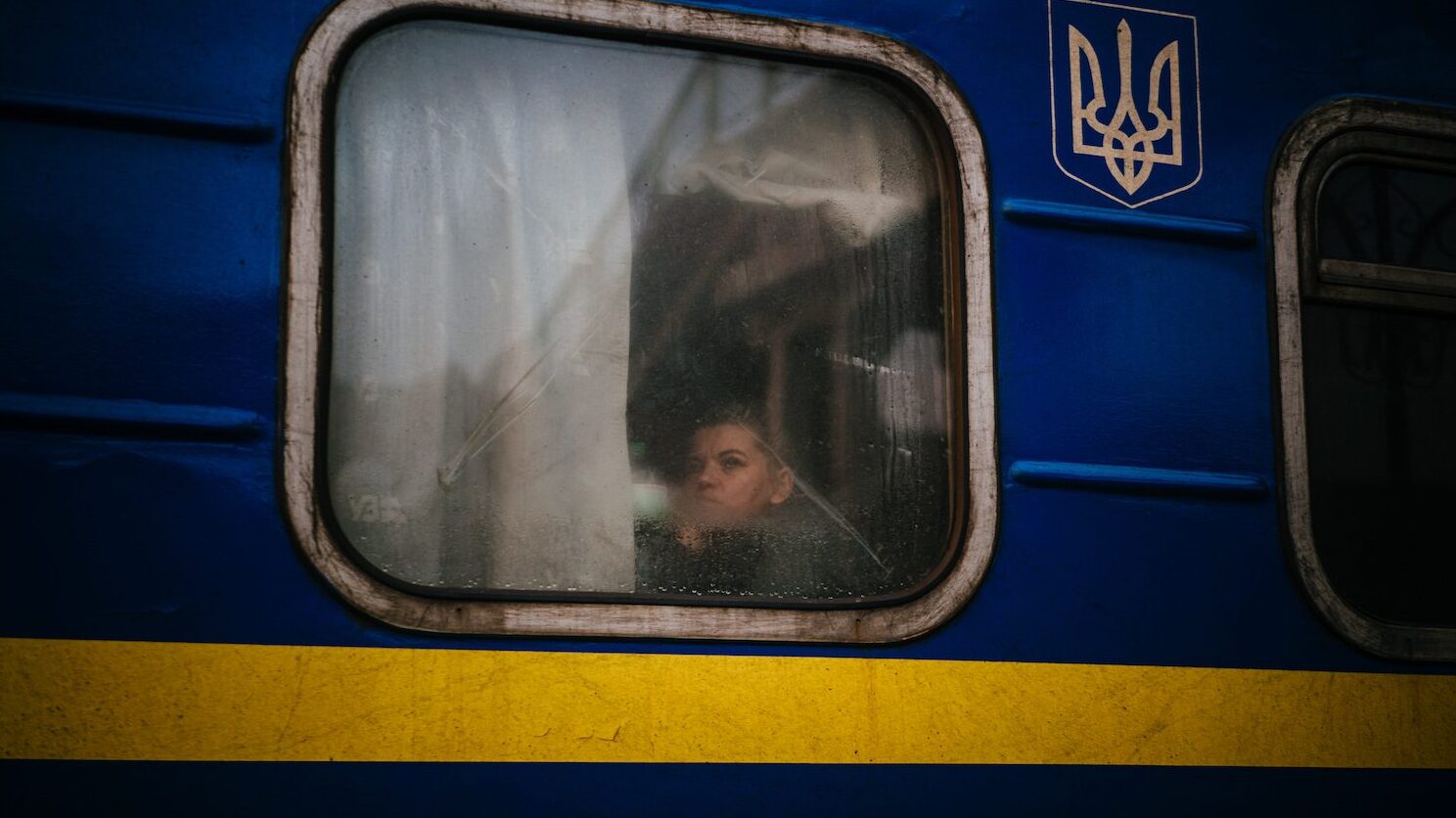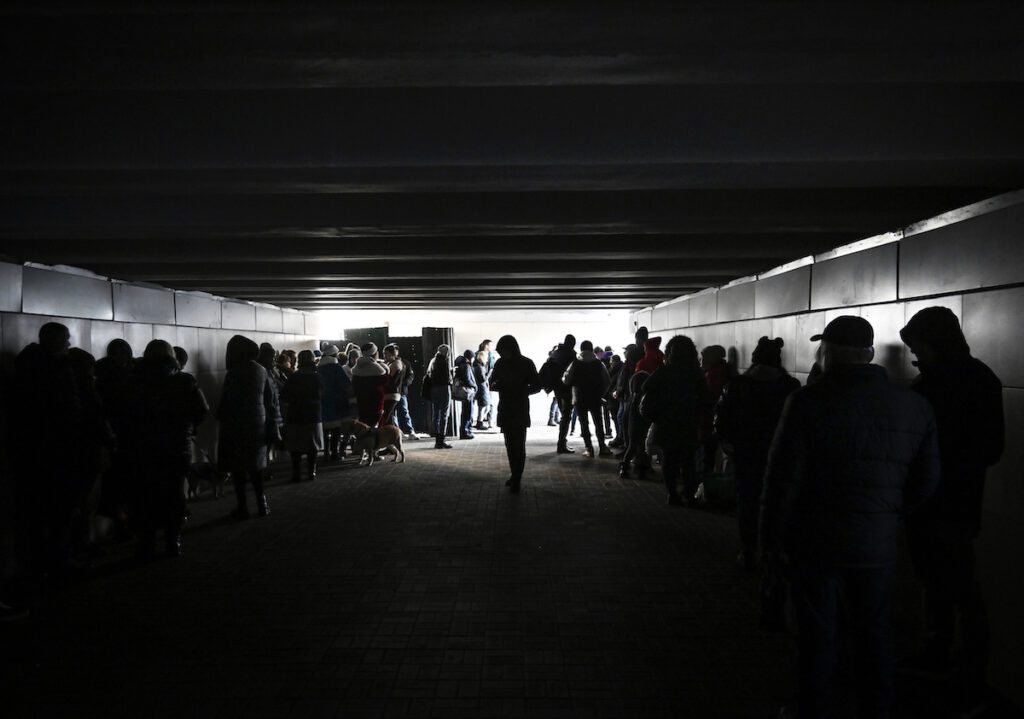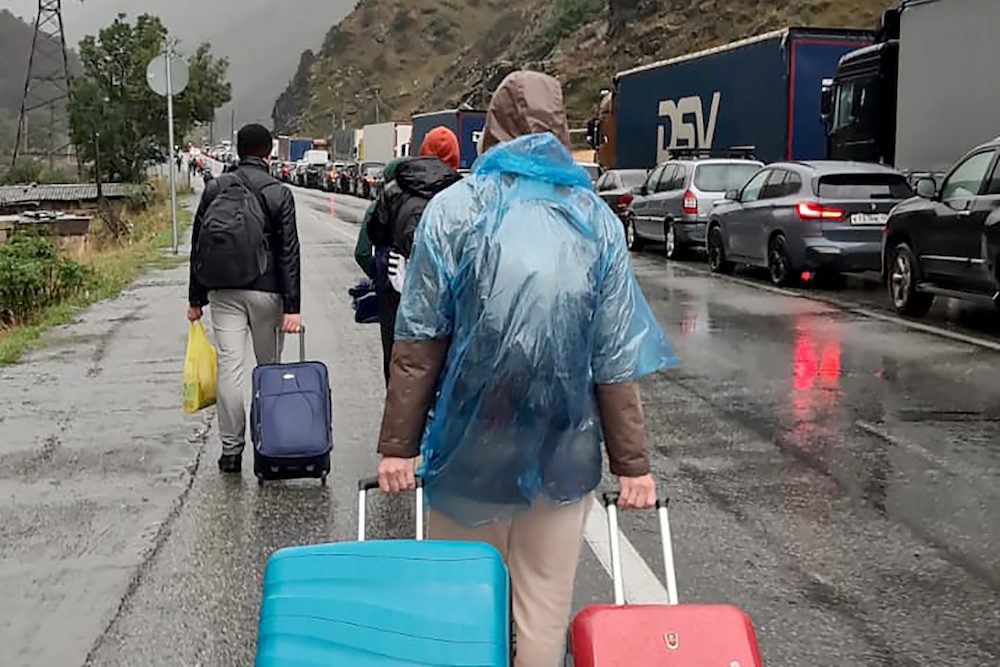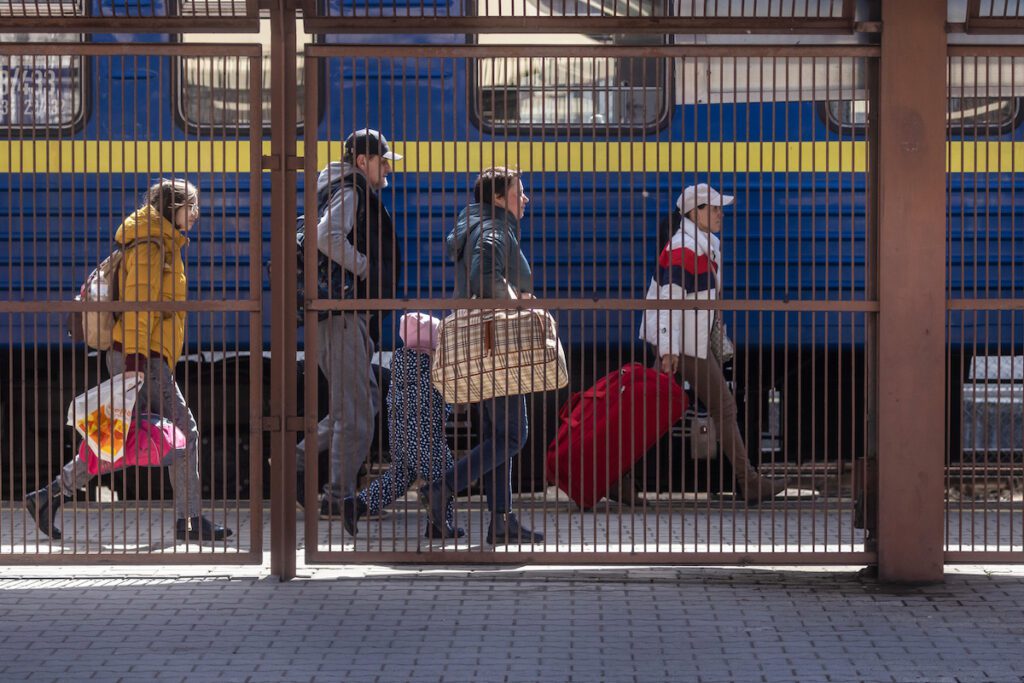
Ukrainians woke on February 24, 2022 to the sounds of explosions and emergency sirens as Russian missiles sailed into targets across the country. Russia had launched what many believed would never actually happen—a full-scale invasion of Ukraine. Since then, as many as 14 million Ukrainians are believed to have fled their homes. Almost half have sought refuge in neighboring countries, while the rest are internally displaced in Ukraine. The destruction in the last 12 months has reduced cities in eastern Ukraine to rubble and damaged as much as 50% of the country’s energy infrastructure through air strikes.
Ordinary Ukrainians in many parts of the country have suffered prolonged blackouts and interruptions in basic services such as water. The United Nations estimates that 40% of Ukrainians have needed humanitarian aid and that 8,000 civilians have been killed and 13,000 injured, though the UN believes the actual figures are likely much higher.
How many troops have been killed is more difficult to calculate, but experts estimate hundreds of thousands have died. UK Minister of Defence Ben Wallace recently said that Putin is “running a meat grinder for an army,” referring to estimates that nearly 200,000 Russian soldiers are believed to have died. Ukraine’s losses are thought to be around 100,000 troops.
Behind these figures are real people, those suffering the consequences of geopolitical maneuvers, calculations, and miscalculations out of their control. The following are some of their stories.
Daria Fedotova, a regular contributor to The European Conservative, has spent the last 12 months in her family home 20 kilometers north of Kyiv.
So far, her village and neighborhood have not been directly attacked, though during Russia’s attempt to capture Kyiv last spring, enemy troops were just a few kilometers from her home. Russian attacks on civilian infrastructure have also brought bombs into the vicinity.
“We live near a hydroelectricity plant and it was targeted several times, but it’s still standing,” she notes.
Despite the hardships of war, Ukrainians have generally managed “to keep calm and carry on,” as Fedotova put it.
“We’re as close to the new normal as we’re going to get,” she said.
She still practices horse riding—until recently, even during air raids. Only after an explosion got too close and startled her horse did she and her riding instructor decide not to take the horse out while the missiles were actively flying in the area.
The hardest part has been dealing with the interruptions in utilities. She bought a power generator when outages were so extended that electricity was only available a few hours a day. Her neighborhood also has its own independent water system. Her family is also able to heat their home with coal or wood if necessary, and luckily, the winter has been mild. But for those in cities, she knows the worst has been the interruption in water service.
“Imagine being in a flat without water,” she says.
Against the pressure of war, she also sees Ukraine developing a more positive, stronger national identity.
“Now people are less prone to whining [about the country’s problems] and use more humor. We consider ourselves fighters,” she said.
This is reflected, too, in the massive public support for the army.
“The people love their army, and their army loves them back,” she says. “For example, when there were army roadblocks [during the battle for Kyiv], we never had a bad experience.”
At the same time, the reality of war wears on Ukrainians, especially psychologically. Darina Rebro, a freelance journalist and contributor to The European Conservative who has spent much of the war in Kyiv, points to two aspects that many Ukrainians are having to face—the inherent instability in the world and survivors’ guilt.
“It seems surreal to realize that this friend or a friend’s husband or father is fighting in a hot spot,” she said.

During the Russian air strike blitz on New Year’s Eve, a rocket hit a building very close to her home in the capital. The casualties were relatively few, but it still took her a long time to process why she and her family had survived and not others. Ultimately there is no rational explanation. She has learned to simply accept reality and focus on the opportunities that life offers and the ways she can still help others, especially as a committed Christian.
Watching the conservative response outside of Ukraine through the media has been a mixed bag for both Fedotova and Rebro. According to Rebro, many Ukrainians have been unpleasantly shocked by the response of Hungarian Prime Minister Viktor Orbán to the war and his lack of support for both economic sanctions against Russia and military aid for Ukraine. Fedotova strongly disagrees with those conservatives who are critical of the West supplying the Ukrainian army with arms.
“We would fight anyway,” Fedotova said, “But we will lose less with the support [from the West].”
Rebro has also been dismayed by those conservatives who have seemed to justify the war by claiming that NATO infringed on Russia’s security interests. From her perspective, Russia has been planning to infringe on Ukraine’s sovereignty since the breakup of the Soviet Union. Ukraine needs Western allies, she believes, and she warns conservatives not to be lured in by Russian propaganda.
“We need the support, especially to combat Russian fake propaganda because it’s not for us that they make it—but for intellectuals in the West,” she says.
One year ago, Alexander Volkov, a 36-year-old Russian graphic designer, had been enjoying a bit of time off from the daily grind of his long-time job when the world around him began to come apart at the seams.
Fifteen years earlier, Alexander had been a third-year law student at Nizhny Novgorod State University, situated 400 kilometers east of Moscow, preparing himself for a career in criminal law, when he began working for the Swedish furniture company IKEA to support himself financially. Despite having gone on to graduate two years later, for him, the choice between working as a criminal lawyer in Russia, where hours are long and grueling and average salaries are quite low, and for IKEA—a rapidly expanding, Western, multinational company—was a simple one. So, over the next decade and a half, Alexander worked at IKEA, slowly and steadily climbing the ranks of the company, eventually working his way up to managing a small team as the head of a graphic design department.
In late February 2022, his two-week vacation was nearly over, and the simple pleasures he had become used to—honing his photography skills, drinking beer with friends until the early morning hours, and playing video games—would, too, soon be coming to an end. The prospect of returning to eight-hour workdays, however, quickly became the least of his worries on February 21st, when President Vladimir Putin formally recognized the independence of Donetsk and Lugansk People’s Republics.
“At that moment, I began to think something big was going to happen,” Alexander told me as we sipped cocktails at Sircha—the bohemian cocktail bar I frequented during the two months I lived in Tbilisi.
Alexander then recalled how three days later, on the 24th of February, he had been awake at 5 a.m. playing video games when Putin appeared on the television screen to announce the “Special Military Operation.” After Putin’s speech, “I stayed up until 6 p.m. the following evening continually doomscrolling,” he told me. The following Monday, Alexander went back to work at IKEA and for the next few days, things remained relatively unchanged. At the beginning of March, however, the European Union passed a sanctions package which banned deliveries of products from Europe to Russia. Subsequently, IKEA began closing stores around Russia but assured Alexander and his colleagues that they would have jobs for at least half a year longer.
Alexander recalled that some weeks later, the Russian State Duma passed a law essentially banning speech that opposes official government narratives. Independent media outlets were banned, which resulted in many relocating abroad to continue their reporting. “When Russian independent media outlets reported that the number of slain Russian soldiers had climbed to 5,000, I felt like my country’s government did not care about its people,” Alexander told me, adding that as time went on, he found it increasingly difficult to speak with his relatives. “It’s sad to admit, but all of them support the course taken by our president,” he lamented.
As we discussed the Russian population’s support for the war, Alexander spoke of a stark generational divide. “Younger people who readily have access to the internet and to VPNs tend not to support the war, while the vast majority of older people who only have access to television support it,” he said.
Fast forward to June. IKEA notified Alexander and his colleagues that the store was on the verge of shutting its doors. Before he left the company that had employed him for the past 15 years, upper-level management at IKEA offered Alexander what he referred to as a “quite generous” severance package, which he currently uses to support himself.
As the summer months passed, Alexander described the mood inside of Russia as having darkened considerably and having become increasingly tense. In light of this, and since he had had no luck finding secure, lasting employment, Alexander recounted to me feeling a deep sense of despondency, describing himself as having become an “out-of-work, night-dwelling layabout.” It was mid to late afternoon on September 21st—the day the Russian president declared a partial military mobilization—when he was awakened by a phone call from a close friend who told him it was time to leave the country.
“Immediately, I watched Putin’s announcement of the mobilization, and two hours later my friend, his wife, and I bought plane tickets to Yerevan, Armenia,” Alexander told me, adding that each of them managed to secure a ticket for around 300 euros. By the end of that day, the price of plane tickets from Russia to Armenia had jumped to around 2,500 euros, he recalled.
He and his friends had no problems leaving the Russian Federation. Customs officials simply asked the group what the purpose of the trip was, to which they responded, “tourism.” Then, after having landed in the Armenian capital, where they remained for two days, Alexander and his friends continued their journey and boarded a marshrutka (a shared taxi van) whose final destination was their own: Tbilisi, the capital of the Republic of Georgia.
“At the Georgian border, guards asked each one of us to go into a small room where we were individually questioned for some time,” he said. “Passports were taken and examined. We were asked routine questions like what we were doing there, how long we would stay, where would we live, and where did we work. Eventually, we all were allowed in.”

Five months later, Alexander still finds himself living in Georgia, and when I asked him how his reception has been, he replied:
There hasn’t been a single Georgian who has told me to go home or expressed any hate or aggression toward me. The people of Georgia, in my view, don’t hate me and don’t hate Russians, but they do have a problem with those who support the war. I understand what my country has done to Georgia.
At the moment, in the sort of life-limbo that he finds himself in, when he’s not holed up in his studio apartment doomscrolling, paying close attention to events unfolding in Russia and Ukraine, or doing a bit of graphic design work remotely for a Russian company, Alexander prefers to spend his time producing short films and taking photographs, and of course, like any good Russian, drinking with friends.
As for the future, he hopes to see Russia and Ukraine reach some kind of a ceasefire before the summer months have passed. If and when that happens, he hopes to eventually return to his home in Nizhny Novgorod.
“I think the war will end at an unexpected time in an unexpected way,” he told me.
In the meantime, Alexander has applied for a work visa in the United States and expects to receive an answer between May and September of this year. He has also applied for work as a graphic designer at various IKEA stores in Europe.
Giorgi, a political science graduate from Tbilisi State University, is a 27-year-old barman working at Sircha in Tbilisi. Immediately upon my first interactions with Giorgi, I took a great liking to him due to his sanguine attitude and easygoing and affable nature. Although he’s lived in Tbilisi for a decade, he spent his childhood years in Ozorgeti, a small, picturesque town in western Georgia situated not far from the Black Sea coast.
Since the Russo-Ukrainian war began one year ago, life has changed considerably for Giorgi and his family. With the influx of hundreds of thousands of Russians and their capital into Georgia, most of whom have relocated to Tbilisi, Giorgi, along with many other Georgians I talked to, consistently spoke of skyrocketing prices, especially in the real estate sector.
“The cost of apartments and homes is out of control,” Giorgi told me, adding that: “It has become quite difficult for an average Georgian family to cover the constantly increasing cost of living.” Naturally, since the war began, things have become much harder for the average family, he said.
Something that one immediately notices while strolling the streets of Tbilisi is the near omnipresent anti-Russian graffiti that lines the city’s walls and building facades. Phrases like “F*ck Russia,” “Russians go home,” and “Russia is a terrorist state,” are spray-painted on any and all surfaces. In light of the apparent socio-political tensions present in the city, in addition to having noticed the existence of ‘Russian bars’ which host mainly Russian patrons, as well as ‘Georgian bars’ which host mainly Georgian patrons, I asked Giorgi about the existence of parallel societies.
He answered:
Some bars and restaurants have their politics, so many Russians don’t feel comfortable. Also due to politics and history, many Georgians would simply rather go to all-Georgian bars and restaurants. Some places are anti-Russian, some places are neutral, and some places are pro-Russian and as a result, there is a natural divide.
Giorgi went on to tell me that before the war, he knew little about Russians, their culture, and their thoughts about politics.
Honestly, after the war started, I was not happy that so many Russians came to Georgia. However, after I got to know Russians at the bar where I work as well as in other places, I came to know their politics, thoughts on the war, and their feelings about the Russian government. I then began to think it was very sensible for them to have come to Georgia. Most of them would be in jail or dead. For me, it’s about the individual’s character.
As for his future plans, Giorgi hopes to travel abroad, spend some time living in continental Europe, gain more work experience, and save some money before returning back to Georgia where he would like to start a business.
During my relatively frequent visits to Sircha cocktail bar, I also became friendly with Max where he, like Giorgi, worked as a barman. A 22-year-old who worked as an assistant director for various Netflix film projects before coming to Tbilisi, Max originally hails from Usinks, in the Komi Republic—one of the four autonomous republics in Russia where Finno-Ugric peoples reside.
In March of 2022, Max made the life-altering decision to leave behind, among other things, an esteemed career as an assistant director for a film company in St. Petersburg that regularly worked with Netflix. With little money to his name, he booked a flight to Armenia, where he would go on to hitchhike his way to Georgia. Shortly after crossing the Georgian border without trouble, Max found himself stranded on the motorway, in the middle of nowhere when the car in which he had been a passenger broke down. Although the situation appeared grim at first, the kindness, generosity, and hospitality of the Georgian people, for which they are well-known, saved the day. He recounted to me how they helped him find a hotel before picking him up and taking him to the bus station the following morning.
Nearly 365 days later, Max told me it has been a year brimming with new experiences.
“From March to April, I was a waiter at a Georgian family restaurant. Then I began frequenting Sircha, where I was eventually hired as a barman,” he said.
When I asked Max about his family and friends back home, he told me he has one friend who signed a military contract before the war began, and as a result, had been sent to Luhansk last summer. My friend says “80% of the people do not want to be there but they don’t have a chance to leave the army because they will be jailed or killed.” As for his family who lives near St. Petersburg, Max, like Giorgi, says the war has made life more difficult for them, as prices have risen substantially. “Sometimes I help them financially and sometimes they help me,” he told me.
In 2023, Max plans to obtain a residence permit in Georgia and to begin Georgian language courses. If the stars align and time permits, he, like Alexander, would like to shoot a short film.
Sonya Petrenko is a 30-year-old Ukrainian make-up artist who has lived in Tbilisi for eight years. As we sat and chatted at Lado, a hip, ultra-post-modern, vintage cocktail bar that mixes Eastern Orthodox, Soviet, Greco-Roman, and classical European aesthetics with bass-thumping techno music, she looked up after gazing into her smartphone and informed me that her hometown, Dnipro, had just been struck by a Russian missile—and that the missile landed a few hundred meters from her grandmother’s apartment.
She proudly explained the role she played, as a student at the time, in the 2014 Maiden Uprising. She recalled how she participated in the demonstrations from the beginning, where she took turns with fellow activists carrying out shifts occupying Kyiv’s main square—sometimes in the daytime and sometimes during the night when temperatures dropped below -15°C.
The first killing during the Maiden Uprising in 2014 took place on the 16th of February, she recalled, before going on to note that more and more people lost their lives on the 18th, 19th, and 20th. She told me that among the slain was her 19-year-old friend who had been shot in the head by a sniper as he helped shuttle wounded protesters to the ad hoc medical facilities. On the night of the 20th, she and her friends took his body back to his hometown where they would hold a funeral with his family. A day later, President Viktor Yanukovych fled the country.
When I asked her how Tbilisi has changed since February 24th, 2022, she bluntly stated that it’s become overcrowded and overpriced due to the massive influx of Russians and other Eastern Slavs. There are too many Russians and many from Belarus and Ukraine have also come, she said, while complaining that half of the people in and around the city center are Russian speakers. Sonya also noted that with the mass arrival of Russians, a lot of money has flowed into Tbilisi, and prices across the board—food, energy, rent—have increased by 30% or more. Russians are, however, opening shops, cafes, and businesses, she acknowledged.
When I asked her about her family, she recalled that in March her mother, who now lives with her in Tbilisi, fled their family home and boarded an evacuation train from Dnipro to Poland. As far as she is aware, their home is still intact. The home of her grandmother, who refuses to leave Dnipro, has suffered minor damage from a nearby missile strike.

After living in Tbilisi for eight years, Sonya feels that it is time to move on for several reasons. She expressed how she no longer feels safe and that she believes there’s a strong possibility that armed conflict could break out in Georgia in the coming years. “I want to leave before it happens,” she said. Furthermore, she spoke of her intense disapproval of the Georgian government, which she regards as pro-Russian.
At the end of our last meeting, held over Zoom days ago, when I asked her if she had any final words for our readers she answered: “Glory to Ukraine! Glory to the heroes!”
